Georgina Rannard
Climate and science correspondent

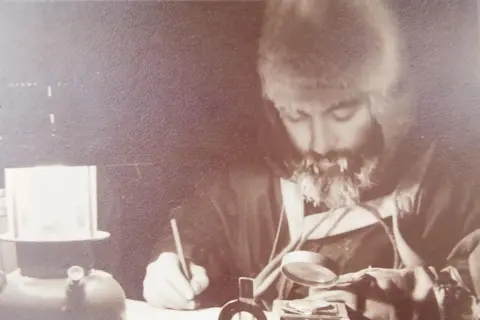 David Bell
David Bell
Dennis Bell was on a two-year assignment in Antarctica
The bones of a British man who died in a terrible accident in Antarctica in 1959 have been discovered in a melting glacier.
The remains were found in January by a Polish Antarctic expedition, alongside a wristwatch, a radio, and a pipe.
He has now been formally identified as Dennis "Tink" Bell, who fell into a crevasse aged 25 when working for the organisation that became the British Antarctic Survey.
"I had long given up on finding my brother. It is just remarkable, astonishing. I can't get over it," David Bell, 86, tells BBC News.

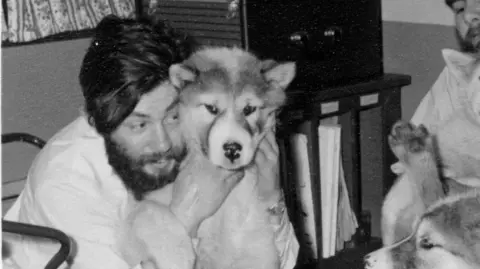 British Antarctic Survey
British Antarctic Survey
Dennis Bell in 1959 at the Admiralty Bay station - he was known for his love of the husky dogs
"Dennis was one of the many brave personnel who contributed to the early science and exploration of Antarctica under extraordinarily harsh conditions," says Professor Dame Jane Francis, director of the British Antarctic Survey .
"Even though he was lost in 1959, his memory lived on among colleagues and in the legacy of polar research," she adds.

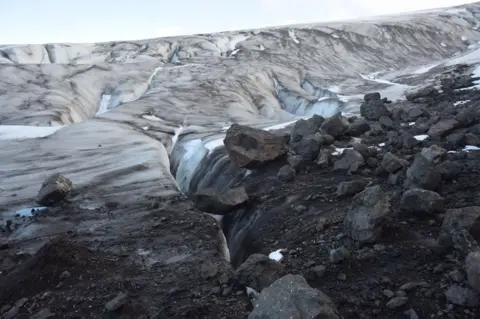 Dariusz Puczko
Dariusz Puczko
The bones were found on the moraine and surface of the Ecology Glacier, on western shore of Admiralty Bay
It was David who answered the door in his family home in Harrow, London, in July 1959.
"The telegram boy said, 'I'm sorry to tell you, but this is bad news'," he says. He went upstairs to tell his parents.
"It was a horrendous moment," he adds.
Talking to me from his home in Australia and sitting next to his wife Yvonne, David smiles as stories from his childhood in 1940s England spill out.
They are the memories of a younger sibling admiring a charming, adventurous big brother.
"Dennis was fantastic company. He was very amusing. The life and soul of wherever he happened to be," David says.

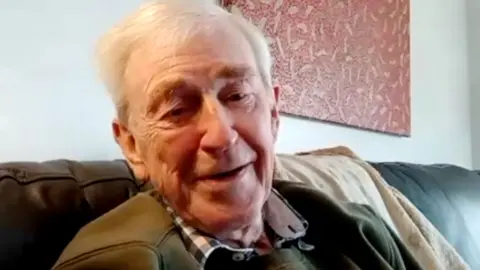
David Bell, 86, spoke to BBC News from his home in Australia
"I still can't get over this, but one evening when me, my mother and father came home from the cinema," he says.
"And I have to say this in fairness to Dennis, he had put a newspaper down on the kitchen table, but on top of it, he'd taken a motorbike engine apart and it was all over the table," he says.
"I can remember his style of dress, he always used to wear duffel coats. He was just an average sort of fellow who enjoyed life," he adds.

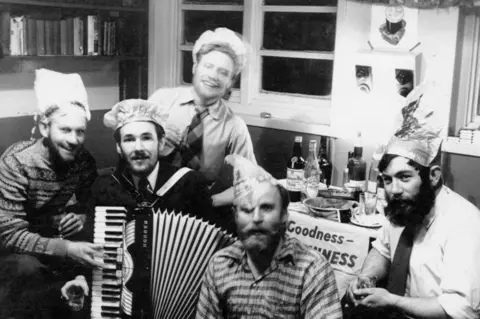 D. Bell
D. Bell
Dennis Bell is on the far right of the picture, celebrating Christmas in Antarctica in 1958 - seven months before he died
Dennis Bell, nicked-named "Tink", was born in 1934. He worked with the RAF and trained as a meteorologist, before joining the Falkland Islands Dependencies Survey to work in Antarctica.
"He was obsessed with Scott's diaries," David says, referring to Captain Robert Scott who discovered the South Pole and died on an expedition in 1912.
Dennis went to Antarctica in 1958. He was stationed for a two-year assignment at Admiralty Bay, a small UK base with about 12 men on King George Island, which is roughly 120 kilometres (75 miles) off the northern coast of the Antarctic Peninsula.

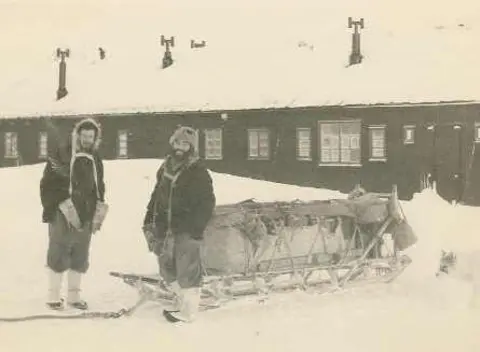 Russell Thompson
Russell Thompson
Men at the base on King George Island relied on sledges and dogs to get around the harsh terrain
The British Antarctic Survey keeps meticulous records and its archivist Ieuan Hopkins has dug out detailed base camp reports about Dennis's work and antics on the harsh and "ridiculously isolated" island.
Reading aloud, Mr Hopkins says: "He's cheerful and industrious, with a mischievous sense of humour and fondness for practical jokes."

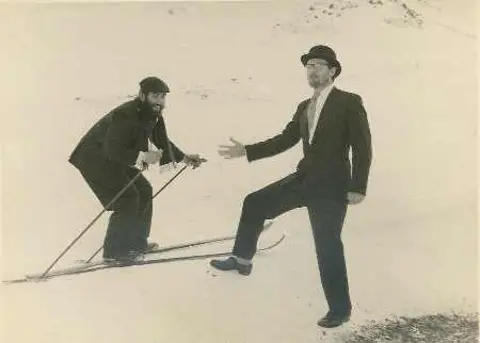 Russell Thompson
Russell Thompson
Dennis Bell (on the left) was known for his sense of humour - he is re-enacting an advert on the snow in this picture
Dennis's job was to send up meteorological weather balloons and radio the reports to the UK every three hours, which involved firing up a generator in sub-zero conditions.
Described as the best cook in the hut, he was in charge of the food store over the winter when no supplies could reach them.
Antarctica felt even more cut off than it is today, with extremely limited contact with home. David recalls recording a Christmas message at BBC studios with his parents and sister Valerie to be sent to his brother.
He was best known for his love of the husky dogs used to pull sledges around the island, and he raised two litters of dogs.

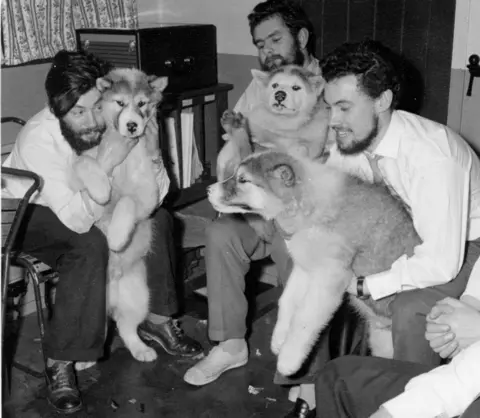 British Antarctic Survey
British Antarctic Survey
Dennis Bell, on the left, with dogs at the Admiralty Bay Station in 1959
He was also involved in surveying King George Island to produce some of the first mapping of the largely unexplored place.
It was on a surveying trip that the accident happened, a few weeks after his 25th birthday.
On 26 July 1959, in the deep Antarctic winter, Dennis and a man called Jeff Stokes left the base to climb and survey a glacier.
Accounts in the British Antarctic Survey records explain what happened next and the desperate attempts to rescue him.
The snow was deep and the dogs had started to show signs of tiredness. Dennis went on ahead alone to encourage them, but he wasn't wearing his skis. Suddenly he disappeared into a crevasse, leaving a hole behind him.
According to the accounts, Jeff Stokes called into the depths and Dennis was able to shout back. He grabbed onto a rope that was lowered down. The dogs pulled on the rope and Dennis was hitched up to the lip of the hole.
But he had tied the rope onto his belt, perhaps because of the angle he lay in. As he reached the lip, the belt broke and he fell again. His friend called again, but this time Dennis didn't reply.
"That's a story I shall never get over," says David.
The base camp reports about the accident are business-like.
"We heard from Jeff […] that yesterday Tink fell down a crevasse and was killed. We hope to return tomorrow, sea ice permitting," it continues.
Mr Hopkins explains that another man, called Alan Sharman, had died weeks earlier, and the morale was very low.
"The sledge has got back. We heard the sad details. Jeff has badly bitten frostbitten hands. We are not taking any more risks to recover," the report reads the day after the accident.
Reading the reports again, Mr Hopkins discovered that earlier in the season, it had been Dennis who'd made the coffin for Alan Sharman.

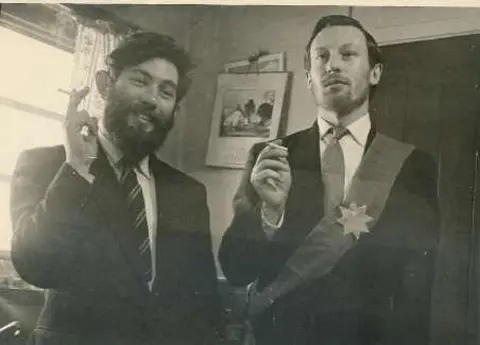 Russell Thompson
Russell Thompson
Dennis Bell (left) and Jeff Stokes (right) photographed before the accident. Jeff Stokes died five weeks ago before hearing the news that Dennis's remains had been found.
"My mother never really got over it. She couldn't handle photographs of him and couldn't talk about him," David says.
He recalls that two men on Dennis's base visited the family, bringing a sheepskin as a gesture.
"But there was no conclusion. There was no service; there was no anything. Just Dennis gone," David says.

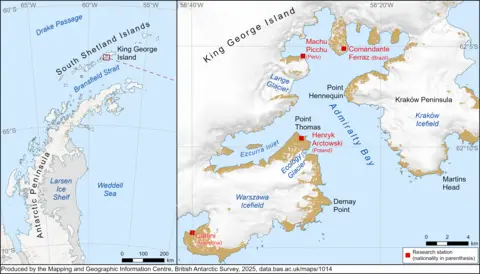 British Antarctic Survey
British Antarctic Survey
Dennis Bell died near Point Thomas in Admiralty Bay
About 15 years ago, David was contacted by Rod Rhys Jones, chair of the British Antarctic Monument Trust.
Since 1944, 29 people have died working on British Antarctic Territory on scientific missions, according to the trust.
Rod was organising a voyage for relatives of some of the 29 to see the spectacular and remote place where their loved ones had lived and died.
David joined the expedition, called South 2015.
"The captain stopped at the locations and give four or five hoots of the siren," he says.
The sea-ice was too thick for David to reach his brother's hut on King George Island.
"But it was very, very moving. It lifted the pressure, a weight off my head, as it were," he says.
It gave him a sense of closure.
"And I thought that would be it," he says.

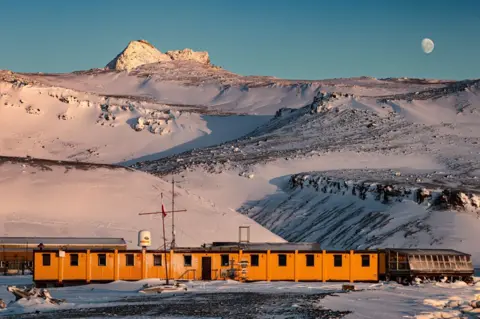 Dariusz Puczko
Dariusz Puczko
Scientists found Dennis's remains by the Henryk Arctowski Polish Antarctic Station
But on 29 January this year, a team of Polish researchers working from the Henryk Arctowski Polish Antarctic Station stumbled across something practically on their doorstep.
Dennis had been found.
Some bones were in the loose ice and rocks deposited at the foot of Ecology Glacier on King George Island. Others were found on the glacier surface.
The scientists explain that fresh snowfall was imminent, and they put down a GPS marker so their "fellow polar colleague" would not be lost again.

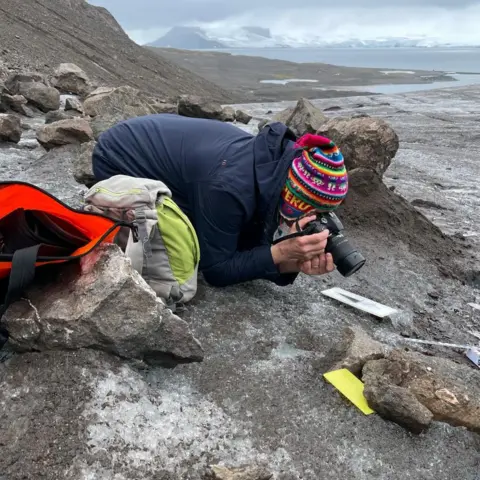 Dariusz Puczko
Dariusz Puczko
Researchers at the Henryk Arctowski Polish Antarctic Station carefully recorded the remains
A team of scientists made up of Piotr Kittel, Paulina Borówka and Artur Ginter at University of Lodz, Dariusz Puczko at the Polish Academy of Sciences and fellow researcher Artur Adamek carefully rescued the remains in four trips.
It is a dangerous and unstable place, "criss-crossed with crevasses", and with slopes of up to 45 degrees, according to the Polish team.
Climate change is causing dramatic changes to many Antarctic glaciers, including Ecology Glacier, which is undergoing intense melting.
"The place where Dennis was found is not the same as the place where he went missing," the team explains.
"Glaciers, under the influence of gravity, move their mass of ice, and with it, Dennis made his journey," they say.
Fragments of bamboo ski poles, remains of an oil lamp, glass containers for cosmetics, and fragments from military tents were also collected.
"Every effort was made to ensure that Dennis could return home," the team say.
"It's an opportunity to reassess the contribution these men made, and an opportunity to promote science and what we've done in the Antarctic over many decades," adds Rod Rhys Jones.

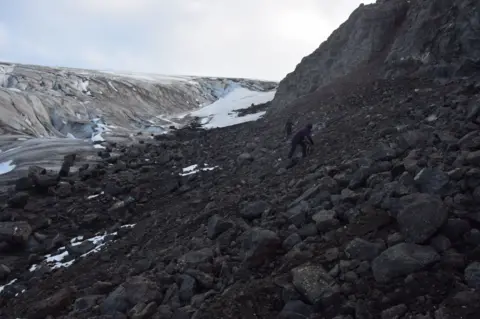 Dariusz Puczko
Dariusz Puczko
Many of Antarctica's glaciers are receding leaving behind rocky material and exposing material trapped inside
David still seems overwhelmed by the news, and repeats how grateful he is to the Polish scientists.
"I'm just sad my parents never got to see this day," he says.
David will soon visit England where he and his sister, Valerie, plan to finally put Dennis to rest.
"It's wonderful; I'm going to meet my brother. You might say we shouldn't be thrilled, but we are. He's been found - he's come home now."
.png)
 4 months ago
16
4 months ago
16


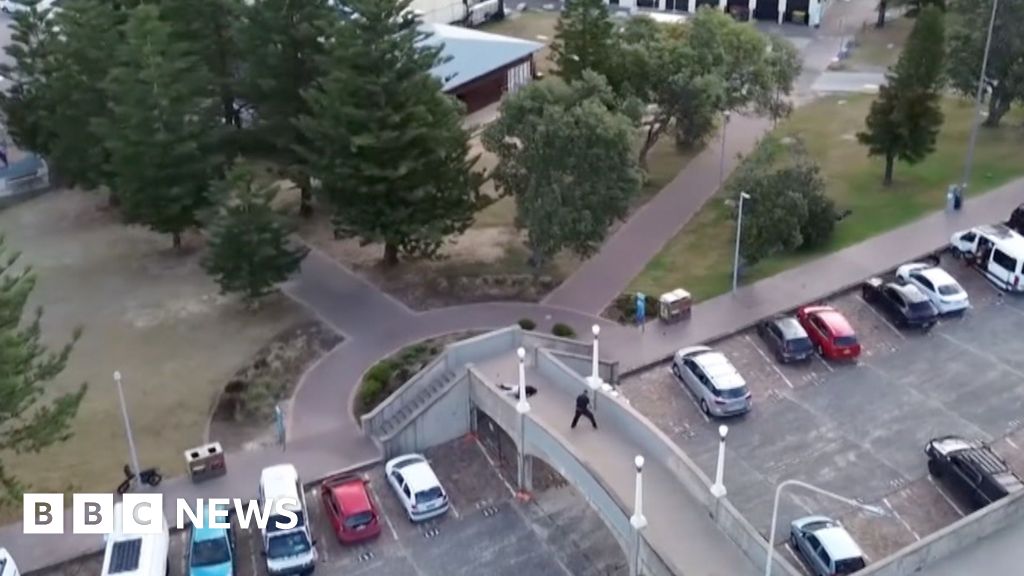





 English (US) ·
English (US) ·